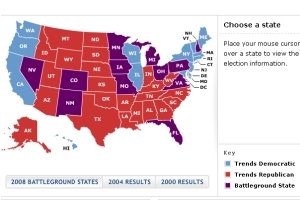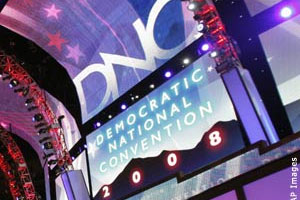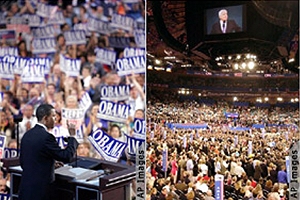America in context
With Conventions Concluded, U.S. General Election Campaign Begins

With the national political party conventions behind them, presidential candidates John McCain and Barack Obama are focusing their efforts on winning undecided voters in battleground states.
To avoid conflicting with the Summer Olympics’ schedule, August 8 to August 24, the parties held their conventions during the end of August and beginning of September, significantly later than previous conventions. This makes the 2008 general election campaign one of the shortest in U.S. history — which requires the candidates to reach a wide variety of voters within a condensed time frame.
As the general election begins, the 2008 race for the U.S. presidency appears to be a close one.
CONVENTION HIGHLIGHTS
Obama received his party’s official nomination during the Democratic National Convention, held August 25-28 in Denver. Delegates nominated him by a voice vote, with the help of his former rival during the primaries, Hillary Clinton. Obama accepted the nomination before a crowd of more than 76,000, saying he would “keep the American promise alive” if elected.
Republicans held their convention September 1-4 in St. Paul, Minnesota, but it got off to a slow start. Party leaders cancelled most of the first day’s scheduled events and encouraged delegates to instead help hurricane relief efforts. McCain accepted the Republican nomination in a speech September 4, in which he described himself as an experienced leader who will bring change. But the highlight for many Republican delegates was a speech given by vice presidential nominee Sarah Palin, her first on a national stage.
PARTY PLATFORMS
Both parties adopted platforms, the official but nonbinding statements of the organizations’ goals and policy positions for the next four years. Both parties consider the 2008 platforms as having been adopted with the most input from average party members in history. Democrats held open meetings across the country to gather feedback while Republicans encouraged Americans to submit ideas via a Web site.
The Democratic platform, titled “Renewing America’s Promise” calls for providing economic relief to those who have lost jobs, investing more in public education, providing affordable health care, helping Americans save for retirement and improving U.S. diplomatic relations. The Democratic Platform (PDF, 59 pages) is available on the Democratic National Convention Web site.
The Republican Party says its platform “shows what the American people can accomplish when government respects their rights, conserves their resources, and calls upon their love of country.” It calls for improving national defense and intelligence gathering, cutting wasteful government spending, improving infrastructure, appointing Constitutionalists judges to courts, lowering taxes and creating a more competitive work force for the global economy. The Republican Platform (PDF, 67 pages) is available on the Republican National Convention Web site.
CANDIDATES VISIT BATTLEGROUND STATES
Since their conventions, the candidates and their running mates have been visiting the country’s most hotly contested states.
McCain and Palin’s first stop after accepting their party’s nominations was in Cedarburg, Wisconsin, on September 5. Most political experts consider the state to be leaning Democratic. More than 12,000 people came to see the Republican candidates speak about job training and lower taxes in front of an ice cream shop. The campaign then visited an outdoor theater in Sterling Heights, Michigan — also a swing state. On September 6, McCain visited the Western battleground state of New Mexico, his fourth visit in about three months. There he touted his plans for tax cuts and oil drilling off U.S. shores.
Obama and his campaign surrogates have visited many of these same states in recent days. On September 8, Obama made his third visit in two weeks to Michigan, where he talked about the economy in a state with one of the nation’s highest unemployment rates. He also gave a speech at fairgrounds in the Republican-leaning state of Indiana September 6 and visited a glass manufacturing plant in Duryea, Pennsylvania, September 5.
Obama’s running mate Joe Biden has visited Wisconsin, Iowa, Pennsylvania and Virginia in recent days touting Obama’s proposals on taxes and Social Security. Campaign surrogates also are speaking to voters in battleground states: Hillary Clinton gave a speech about the economy and visited union members in Florida September 8. Potential first lady Michelle Obama also held campaign events in recent days.
The candidates will take a brief stop from the campaign trail to make a joint appearance at the World Trade Center site to commemorate the seventh anniversary of the September 11 terrorist attacks. “All of us came together on 9/11 — not as Democrats or Republicans — but as Americans,” they said in a joint statement.
McCain and Obama will participate in three televised debates beginning September 26. Biden and Palin will debate October 2.
By Michelle Austein
Staff Writer
WHAT IS A BATTLEGROUND STATE?
Many states have a history of their voters consistently favoring one party, but voters in battleground states, also called swing states, are so evenly divided in their political allegiances that statewide support switches from one party to another. Presidential candidates will focus much of their campaign efforts on winning those states. There likely will be about a dozen swing states in the 2008 election, including states that are often political battlegrounds such as Florida and New Mexico. New swing states might emerge in 2008, such as Virginia, which has supported Republican presidential candidates for decades but has favored Democrats in recent state and local races.
Distribution of 2008 Electoral Votes
Votes are allocated based on the 2000 Census.
Total Electoral Vote: 538; Majority Needed to Elect: 270
Alabama 9
Alaska 3
Arizona 10
Arkansas 6
California 55
Colorado 9
Connecticut 7
Delaware 3
D.C. 3
Florida 27
Georgia 15
Hawaii 4
Idaho 4
Illinois 21
Indiana 11
Iowa 7
Kansas 6
Kentucky 8
Louisiana 9
Maine 4
Maryland 10
Massachusetts 12
Michigan 17
Minnesota 10
Mississippi 6
Missouri 11
Montana 3
Nebraska 5
Nevada 5
New Hampshire 4
New Jersey 15
New Mexico 5
New York 31
North Carolina 15
North Dakota 3
Ohio 20
Oklahoma 7
Oregon 7
Pennsylvania 21
Rhode Island 4
South Carolina 8
South Dakota 3
Tennessee 11
Texas 34
Utah 5
Vermont 3
Virginia 13
Washington 11
West Virginia 5
Wisconsin 10
Wyoming 3
Source: U.S. Federal Election Commission Last Update: 10/3/03
Recently on America in context
Barack Obama Selects Delaware Senator Joe Biden as Running Mate
 Long-serving leader brings years of foreign policy experience to ticket
Long-serving leader brings years of foreign policy experience to ticket
FAQ on Political Conventions
 The processes of the political national conventions have evolved over more than a century, but the purpose has remained the same -- to nominate presidential candidates and lay out goals and party priorities.
The processes of the political national conventions have evolved over more than a century, but the purpose has remained the same -- to nominate presidential candidates and lay out goals and party priorities.
For Many Americans, Hard Work Is Badge of Honor
 Americans generally work more hours and take fewer vacations than workers in other advanced economies. But are they enjoying life less?
Americans generally work more hours and take fewer vacations than workers in other advanced economies. But are they enjoying life less?